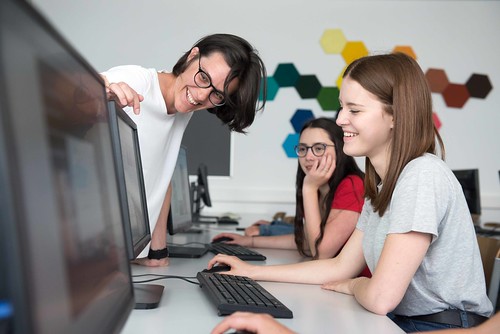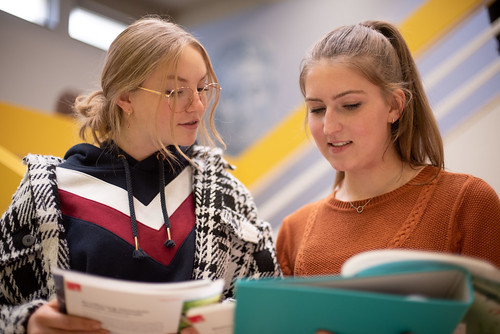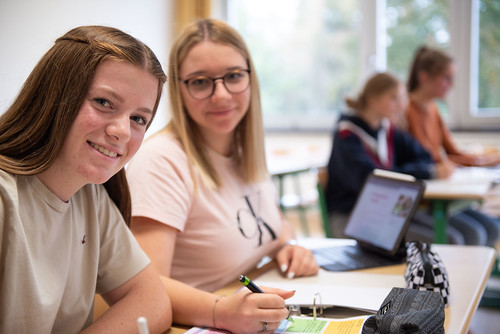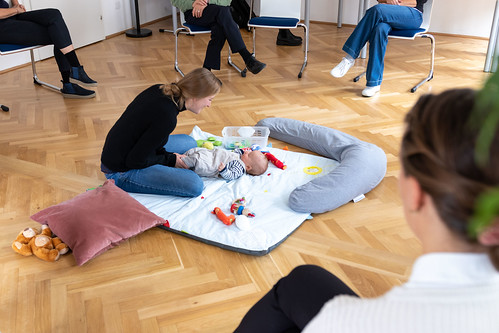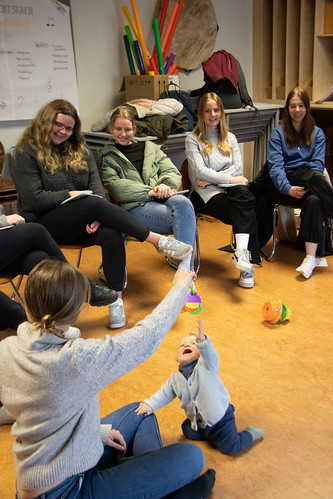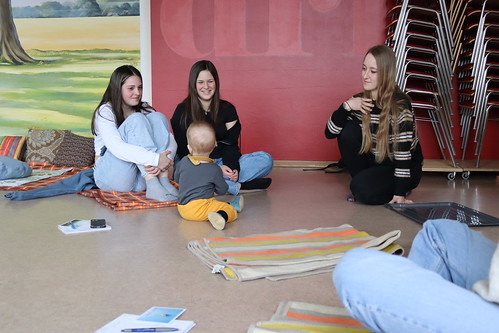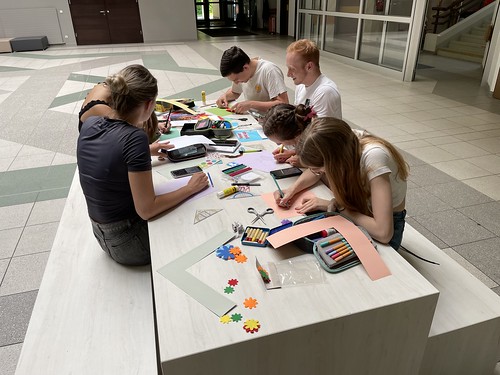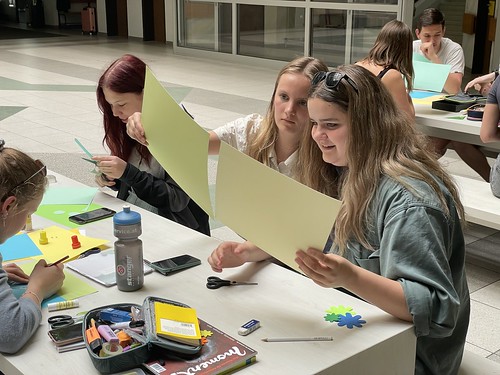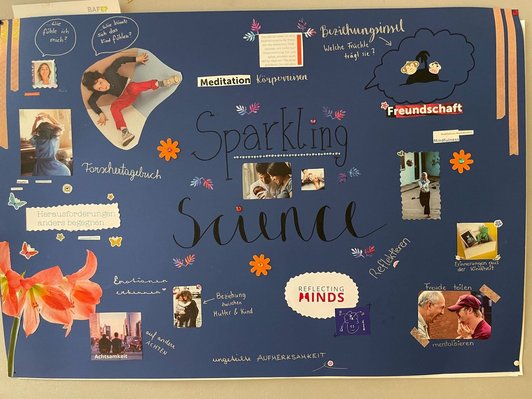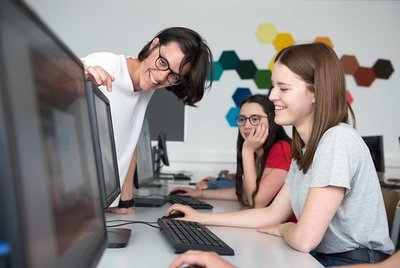Reflecting Minds
Development of a mentalization training for elementary educators
Working in elementary education has become increasingly demanding in recent years. High workload, staff shortages, and the diverse needs of young children pose significant challenges for educators. This underscores the importance of teaching future educators how to regulate one’s own emotions and stress and remain sensitive even in challenging situations.
This is where the project “Reflecting Minds” comes in. Mentalizing, which describes the ability to perceive and understand thoughts, feelings, and intentions in oneself and others, is considered an important resource in the pedagogical context. It helps educators cope more effectively with stress and engage in sensitive interactions. Within the project, we developed and evaluated a new mentalization training together with students and teachers acting as citizen scientists at two colleges for early childhood education.
A central component of this training is the observation of a mother–infant dyad, which regularly visits the class and interacts in a natural play situation. Participants are guided to generate hypotheses about the perspectives, feelings, and intentions of both mother and baby, and then jointly reflect on how the interaction affected them personally. Additional exercises further deepen mentalizing skills: meditations and mindfulness practices, guided imagery, structured reflection worksheets, and playful activities that foster perspective-taking and the perception of emotional signals.
To evaluate the effectiveness of the training, we compared three different groups: classes that took part in the mentalization training with interaction observations, classes that received the training without observations, and classes following regular instruction. Standardized questionnaires, video-based interaction observations, as well as qualitative and quantitative interviews were used to capture both measurable changes and personal experiences of the students. The preliminary results are promising: students in both training groups showed greater motivation to engage in mentalizing, and their empathy skills improved significantly. Participants also reported an improved ability to perceive and articulate emotions of themselves and others, and to respond more constructively to stress.
These developments are particularly significant because they suggest that young people can acquire skills already during school that support their own well-being while also contributing to sensitive, mentalizing-oriented care for children. With Reflecting Minds, we not only developed a new and easily implementable training program, but established valuable foundations for further research. The close collaboration with the citizen scientists was a key success factor and demonstrates how enriching participatory research can be in educational settings. The insights and materials developed in the project offer a promising starting point for embedding mentalization-focused training in early childhood education and professional development.
This project is already completed.
Publikation
-
Dinzinger, A: Entwicklung eines Mentalisierungstrainings für die elementarpädagogische Ausbildung (Opens in new window)2025-11-04, 3. Innsbrucker Fachtagung für Elementarpädagogik Innsbruck
-
Dinzinger, A: Mentalizing and Attachment as Stress Protectors in Elementary Education (Opens in new window)2025-11-04, International Attachment Conference Rouen
-
Schiller, J - Dinzinger, A - Priewasser, B: The Influence of Emotion Regulation on the Relation between Menztalizing and Perceived Stress in Trainee Elementary Educa-tors (Opens in new window)2025-11-04, 3. Early Life Care Konferenz/26. Jahrestagung der GAIMH. Salzburg
-
Schiller, J - Dinzinger, A - Priewasser, B: The Influence of Emotion Regulation on the Relation between Menztalizing and Perceived Stress in Trainee Elementary Educators (Opens in new window)2025-11-04, Österreichische Jugendforschungstagung Innsbruck
-
Wusatiuk, C - Dinzinger, A - Priewasser, B: Die Relevanz der Mentalisierungsfähigkeit für das subjektive Stressempfinden angehender Elementarpädagog:innen (Opens in new window)2025-11-04, Österreichische Jugendforschungstagung Innsbruck
-
Dinzinger, A - Priewasser, B: Ein Mentalisierungstraining für das elementarpädagogische Ausbildungscurriculum (Opens in new window)2025-11-04, 53. DGPs Kongress: menschen mitwelt medien - Universität Wien Wien
-
Dinzinger, A - Wusatiuk, C: Mentalisieren als Ressource im pädagogischen Alltag (Opens in new window)2025-11-04, 29. Jahrestagung der GAIMH: Auf und in die Welt kommen – Räume früher Kindheit Buchs
-
Wusatiuk, C - Dinzinger, A - Priewasser, B: Wie die Mentalisierungsfähigkeit das Verhältnis zwischen Pädagog*innen und Kindern prägt (Opens in new window)2025-11-04, 4. Early Life Care Konferenz Salzburg
-
Wusatiuk, C - Dinzinger, A - Priewasser, B: The Role of Attachment and Mentalizing for the Well-being among Elementary Educators (Opens in new window)2025-11-04, PMU Science Get Together Nürnberg
-
Dinzinger, A - Wusatiuk, C - Priewasser, B: Die Rolle der Mentalisierungsfähigkeit bei stressbedingten Beschwerden angehender Elementarpädagog*innen (Opens in new window)2025-11-04, 4. Innsbrucker Fachtagung zur Elementarpädagogik Innsbruck
-
Wusatiuk, C - Dinzinger, A - Priewasser, B: Mentalisieren und Bindung als schützende Ressourcen vor Stress (Opens in new window)2025-11-04, 53. DGPs Kongress Wien
-
Wusatiuk, C: Entwicklung eines Mentalisierungstrainings bei angehenden Elementarpädagog:innen (Opens in new window)2025-11-04, Paris Lodron Universität Salzburg
-
Schulz, V: The Role of Emotion Regulation and Self-Rated Mentalizing within Stress in a Pupil Sample (Opens in new window)2025-11-04, Paris Lodron Universität Salzburg
-
2025-10-28, Paris Lodron Universität Salzburg
-
2025-10-28, Paris Lodron Universität Salzburg
-
2025-10-28, Paris Lodron Universität Salzburg
-
Pablik S.: Die Verbesserung von Mentalisieren und Stress durch eine Intervention bei angehenden Elementarpädagog*innen (Opens in new window)2025-10-28, Paracelsus Medizinische Universität Salzburg
-
Stärkel F.: Eine Brücke zwischen Bindung und Stress: Mentalisierungsfähigkeit bei angehenden Elementarpädagog*innen (Opens in new window)2025-10-28, Paris Lodron Universität Salzburg
-
Gabelberger A.: Stress ade - Mentalisierung olé : wie Mentalisierungsfähigkeit, Bindungsverhalten und Stresserleben zusammenhängen (Opens in new window)2025-10-28, Paris Lodron Universität Salzburg
-
Schiller J.: The Relation between Mentalization and Stress: Investigating the Influence of Emotion Regulation in Trainee Elementary Educators (Opens in new window)2025-10-28, Paris Lodron Universität Salzburg
 Schools
Schools
 Partners from Economy and Society
Partners from Economy and Society
 Scientific institutions
Scientific institutions

